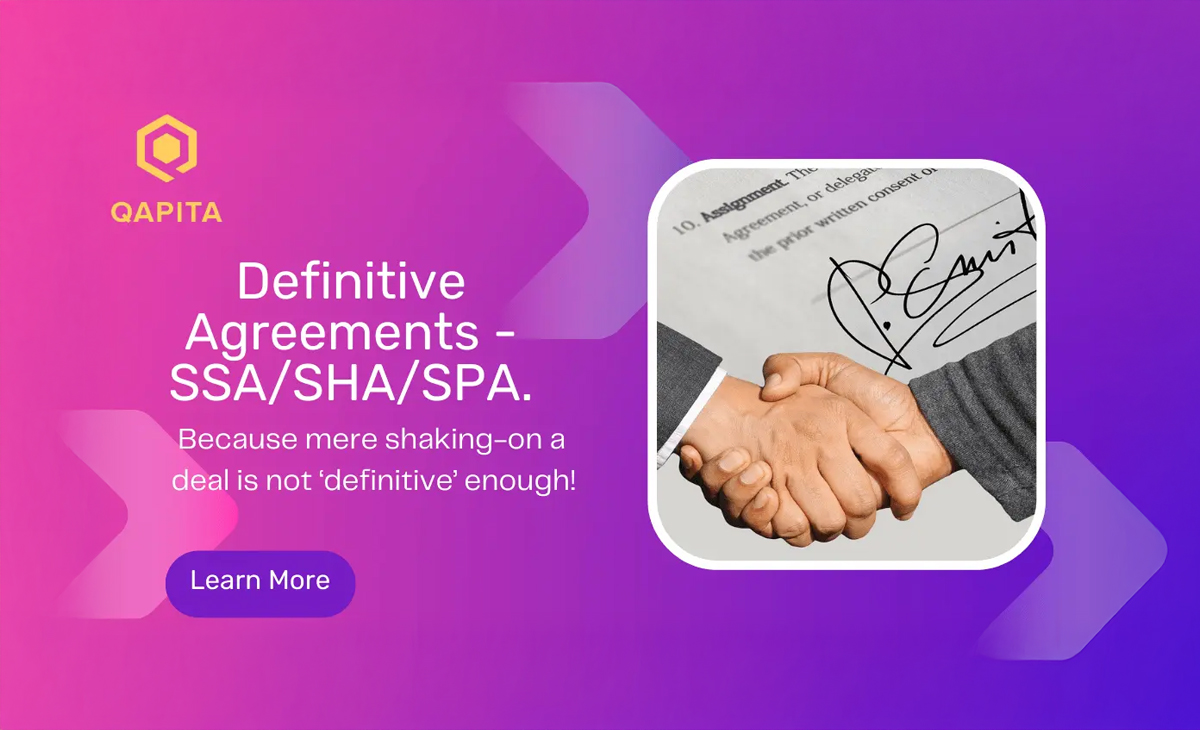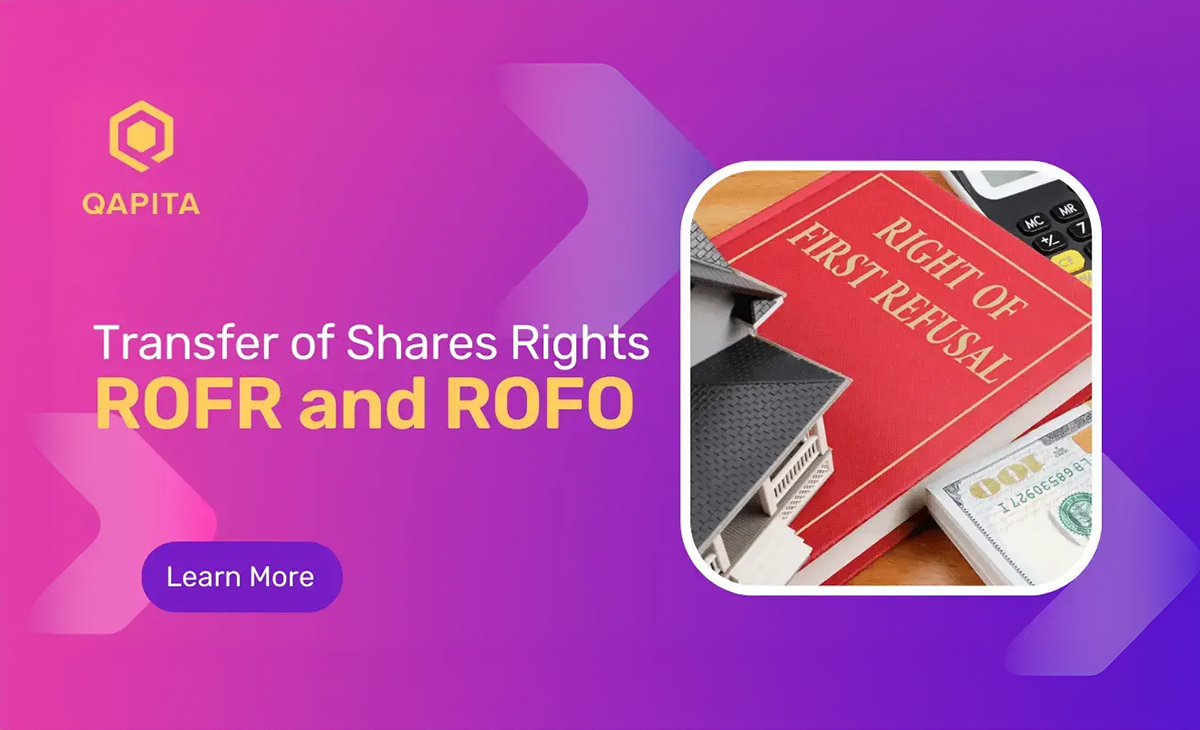Welcome to this new series on SHA101 as part of SeekingQapitaL blog!
These are fascinating times for founders to build scalable businesses in India and SEA as:
1. Sectors are opening up, getting organized and throwing massive opportunities for problem solvers,
2. regulations are increasingly getting liberalised,
3. technology advancements are providing unprecedented tailwinds.
4. lastly and most importantly, capital is easily available across stages of venture building.
As founders are going after these massive opportunities and raising large amounts of capital, it is important for them to realise that with each round of funding they are sharing not just ownership but also control of their company with their investors. While the former is obvious and well understood, the latter is often overlooked by founders.
In this blog series, I intend to write a series of posts (SHA101) on demystifying the various terms and clauses that are part of a typical Shareholders' Agreement (SHA) that are executed as part of the investment rounds. SHA or other forms of definitive agreements are legally binding agreements signed between parties and have several implications for the company and founders that they need to be aware of.
This SHA101 series aims to empower founders with right knowledge and awareness to execute such definitive agreements in the future, fully understanding the implications of the various terms and clauses they sign-up for in these documents.
What are Definitive Agreements?
If you have raised funds in the past or have tracked investments in startups, you would have definitely come across terms like: SSA, SHA, SPA or Definitive Agreements. Let's aim to demystify these terms in this blog.
Definitive Agreements
In the context of investment, a 'definitive agreement' is the final, legally binding document signed by all the parties of the transaction which puts forth the agreed terms along with rights and obligations of the parties involved in the transaction. Some things to note:
1. Legally binding document. Typically executed on a Stamp Paper with appropriate stamp duty paid based on the local jurisdiction.
2. Signed by all the parties involved in the transaction.
3. Most Common Examples: Shareholders' Agreement (SHA), Share Subscription Agreement (SSA), Share Purchase Agreement (SPA)
4. termsheet is not a definitive agreement. But definitive agreements typically follow the signing of a term sheet.
5. Definitive documents are necessary and form the basis of consummating certain transactions such as sale of shares between parties, issuance of shares against innestment among others.
6. Definitive agreements contain terms of the transaction, right and obligations of parties and many other standard legal clauses which we'll discuss in this blog series.
What is an SSA?
A Share Subscription Agreement (SSA) as the name indicates is related to subscription of new shares of the company by a set of existing or new shareholders. Points to note:
1. SSA is executed when a company is raising an investment from investors in lieu of shares issued by the company to the investors. Such shares are said to be 'subscribed' by the investors and hence the name SSA.
2. SSA typically consists of the details of the subscription amount, share price, number of securities, relevant dates and capitalization table (shareholding) details.
3. In some cases, SSA can also be integrated within the SHA document which details the other terms of the transaction between the shareholders. In such cases it is typically referred to as an SSA/SHA or also simply as SHA
What is a SPA?
A Share Purchase Agreement (SPA) is executed between parties when one party is buying or 'purchasing' shares from existing shareholders. Hence the name Share Purchase Agreement
Like in case of SSA, sometimes SPA too is part of the larger SHA document and is referred to as SPA/SHA.
What is a SHA?
Shareholders' Agreement is a comprehensive definitive agreement entered into by shareholders and the company and outlines the rights, preferences and obligations of all the shareholders.
While subscription of shares makes a shareholder the economic owner of the company, it is the provisions contained in the SHA that determines the extent to which the company and promoters are ceding the control and governance of the company to certain shareholders, typically the investors.
Some examples of such rights and preferences are:
1. Board Reconstitution: offering board seats to investors,
2. Liquidation preferences, anti-dilution, exit rights.
3. Reserved matters or affirmative rights of the investor,
4. Pre-emptive and share transfer rights (ROFO/ROFR) etc.
Apart from rights and preferences, SHA would also contain standard clauses around:
1. Breach, Events of Default by parties and Termination
2. Reps & Warranties, Indemnity, Confidentiality
3. Non-Compete, Promoter Lock-in etc.
4. Dispute Resolution, Arbitration, Governing Law etc.
5. Shareholding pattern /cap tables, milestones and business plan in the Annexure
6. ESOP Pool size and creation
We'll cover these aspects in detail in the coming editions.
SHA vs. Termsheet?
Many a times, SHA and Termsheet are interchangeably used as the document against which an investment is raised.
They are in this regard; you might have heard of cliched analogies such as
Termsheet is like an engagement, while SHA is the actual marriage of sorts between the startups and investors in some sense.
Here are a few more points that you can make note of:
1. Termsheet is Intent: Termsheet is generally only a 'firm intent to invest' by the investor with the defined terms. It also is an abridged version of the eventual SHA/definitive agreement that parties would sign.
2. SHA is Binding: However, SHA is a legally binding document and not abiding by it will constitute a breach.
3. Can Investors renege on a signed termsheet? While investors can technically renege on a termsheet commitment, it is not an ideal situation. That said, there have been cases I have seen personally where a deal has not gone through post the execution of termsheet.
There can also be technical grounds on why deals fall through after signing of termsheets. Such as:
1. Period to Accept: There is a max period of acceptance of a termsheet when an investor issues it (typically 2 week or lesser, could also be 4 weeks in some cases when one is closing a larger round).
2. Period to Close Round: There is also a maximum time to close the deal (in many cases it is the execution of definitive documents) which could be 8 weeks or 12 weeks. If startups don't accept or close the deal in these cases, the termsheet becomes no longer valid and investors have all the right to walk away.
Notwithstanding these max periods to accept/close, if the 'intent to invest' is strong then these timelines don't matter! I have seen a deal going through after 1.5 years of signing the termsheet! :)
1. Any Conditions Precedent to signing Definitive documents not met: This could be any criteria like transfer of IP, hiring of key management, founders quitting their fulltime jobs etc. which are part of the termsheet.
2. Due Diligence Red Flags: Investors do a formal due-diligence of the startups they invest in. This involves studying all aspects of a startup from a legal and financial standpoint. Any inconsistencies, gaps are highlighted and need to be cured. Occasionally if the issues are severe, it might lead to the deal falling apart.
Stay tuned for more and let's explore this #SHA elephant together as we discuss the various investor rights, terms and clauses in the coming editions.


 ESOP Management
ESOP Management

 Liquidity Solutions
Liquidity Solutions

 ESOP Consulting
ESOP Consulting

 Fund Management
Fund Management













































